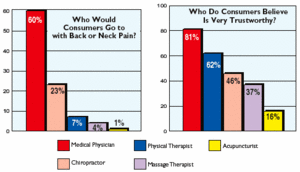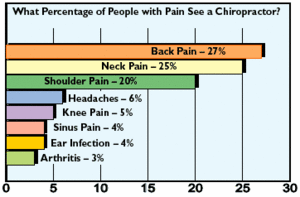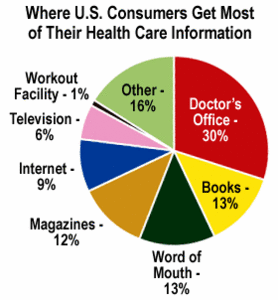New York's highest court of appeals has held that no-fault insurers cannot deny no-fault benefits where they unilaterally determine that a provider has committed misconduct based upon alleged fraudulent conduct. The Court held that this authority belongs solely to state regulators, specifically New York's Board of Regents, which oversees professional licensing and discipline. This follows a similar recent ruling in Florida reported in this publication.
FCP Survey Results
One of the first efforts of the recently formed Foundation for Chiropractic Progress (FCP)1 was to conduct a brutally honest survey of U.S. consumers on their attitudes of chiropractic and doctors of chiropractic. Even before the FCP scored its first big article in the New York Daily News,2 it was reviewing the results of the survey to better understand the U.S. health care market.
"It's impossible to know if you're making any progress unless you have a starting point," asserted FCP President Kent Greenawalt. "Our goal is to place 24 positive chiropractic articles in major newspapers and magazines to see if we can change public opinion toward chiropractic. If we can, and we can measure that change reliably, then we will know how much money it takes to influence health care decisions of 100,000 nonchiropractic patients toward chiropractic."
The FCP survey


Here are the most significant results of the FCP survey:


Those with Back or Neck Pain Who Did See a Chiropractor vs. Those Who Did Not
"If you experienced an injury that caused pain to your back or neck, whom would you most likely turn to for treatment?"
| ||||||||||||||||||
Perceived Trustworthiness: Did See a Chiropractor vs. Did Not
The respondents rated trust on a scale of one to five: "1" being "not at all trustworthy" and "5" being "extremely trustworthy." (Based on a combined rating of 4 or 5.)
| ||||||||||||||||||
Conditions Most Effectively Treated: Did See a Chiropractor vs. Did Not
"Of the following conditions, which ones do you think would be most effectively treated by a chiropractor?"
|

When Consumers Get to Know You, They Trust You
These results suggest that chiropractic still has a long way to go to establish a high level of trust with most Americans. This and other factors no doubt contribute to the low chiropractic usage figures for patients in pain.
The good news is that once people see a doctor of chiropractic, they are very satisfied with the care, develop a high level of trust and will likely go to the chiropractor for future ailments. The other bit of good news comes from those places where consumers get their health information. By providing information in their offices, on line, and ensuring that their patients are well-educated about the value of chiropractic care, DCs can impact the opinions of more than half the people in the U.S. This can be done with little expenditure on the part of the doctor.
References
- The Foundation for Chiropractic Progress is a nonprofit public relations organization created by Kent Greenawalt, president of Footlevelers, Inc. The original article announcing the FCP was: "Broadcasting the Wonders of Chiropractic," Dynamic Chiropractic, February 11, 2002 (www.chiroweb.com/archives/20/04/02.html).
- FCP scores first big hit: Over 740,000 read about chiropractic in the New York Daily News. Dynamic Chiropractic, May 6, 2002 (www.chiroweb.com/archives/20/10/05.html).



